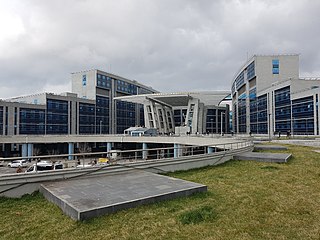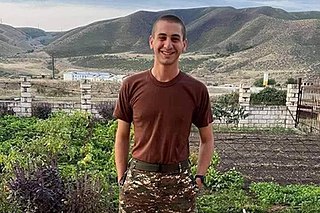
Nagorno-Karabakh is a landlocked region in the South Caucasus, within the mountainous range of Karabakh, lying between Lower Karabakh and Zangezur, and covering the southeastern range of the Lesser Caucasus mountains. The region is mostly mountainous and forested.

Artsakh, officially the Republic of Artsakh or the Nagorno-Karabakh Republic, is a breakaway state in the South Caucasus supported by Armenia, whose territory is internationally recognized as part of Azerbaijan. Artsakh controls part of the former Nagorno-Karabakh Autonomous Oblast, including the capital of Stepanakert. It is an enclave within Azerbaijan. Its only overland access route to Armenia is via the 5 km (3.1 mi) wide Lachin corridor which is under the control of Russian peacekeepers.

Khojaly District is one of the 66 districts of Azerbaijan. It is located in the west of the country and belongs to the Upper Karabakh Economic Region. The district borders the districts of Kalbajar, Lachin, Shusha, Agdam and Khojavend. Its capital and largest city is Khojaly. As of 2020, the district had a nominal population of 28,800.

Politics of Artsakh takes place within the constraints of a written constitution, approved by a popular vote, that recognises three branches of government: executive, legislative and judicial. The executive branch of government is exercised within a framework of a presidential representative democratic republic, whereby the President of Artsakh is both the head of state and the head of government. The legislative branch of government is composed of both the Government and the National Assembly. Elections to the National Assembly are on the basis of a multi-party system. As of 2009, the American-based non-governmental organisation, Freedom House, ranks Artsakh above both Armenia and Azerbaijan in terms of political and civil rights. The republic is de facto independent and de jure a part of Azerbaijan. None of the elections in Artsakh are recognised by international bodies such as the OSCE Minsk Group, the European Union or the Organisation of Islamic Cooperation. Both Azerbaijan and Turkey have condemned the elections and called them a source of increased tensions.

The president of Artsakh is the head of state and head of government of the de facto Republic of Artsakh.
Nagorno-Karabakh is located in the southern part of the Lesser Caucasus range, at the eastern edge of the Armenian Highlands, encompassing the highland part of the wider geographical region known as Karabakh. Under Russian and Soviet rule, the region came to be known as Nagorno-Karabakh, meaning "Mountainous Karabakh" in Russian. The name Karabakh itself was first encountered in Georgian and Persian sources from the 13th and 14th centuries to refer to lowlands between the Kura and Aras rivers and adjacent mountainous territory.
The Karabakh Council was an unrecognised government of Nagorno-Karabakh of eastern Armenia between 1918–1920. It was elected by the Karabakh Congress, the representative body of the people of Nagorno-Karabakh, on July 27, 1918. Initially it was called the People's Government of Karabakh, but in September, 1918 it was renamed into the Karabakh Council. The claims surrounding the council 1918-1920 are related to the historical Artsakh province and the contemporary self-proclaimed Republic of Artsakh founded in 1991.

The Constitution of the Republic of Kazakhstan is the highest law of Kazakhstan, as stated in Article 4. The Constitution was approved by referendum on 30 August 1995. This date has since been adopted as the "Constitution Day of the Republic of Kazakhstan".

The Constitution of Armenia was adopted by a nationwide Armenian referendum on July 5, 1995. This constitution established Armenia as a democratic, sovereign, social, and constitutional state. Yerevan is defined as the state's capital. Power is vested in its citizens, who exercise it directly through the election of government representatives. Decisions related to changes in constitutional status or to an alteration of borders are subject to a vote of the citizens of Armenia exercised in a referendum. There are 117 articles in the 1995 constitution. On November 27, 2005, a nationwide constitutional referendum was held and an amended constitution was adopted. The constitution was amended again in a national referendum on December 6, 2015 that changed the political structure from a semi-presidential system to a parliamentary republic.

Arayik Vladimiri Harutyunyan is the incumbent President of Artsakh. He was formerly the State Minister and Prime Minister of the Republic of Artsakh. He was the last Prime Minister of the country before the office of Prime Minister was abolished in 2017.

The following outline is provided as an overview and topical guide of the Republic of Artsakh and Nagorno-Karabakh region:

Daşbulaq or Astghashen is a village de facto in the Askeran Province of the self-proclaimed Republic of Artsakh, de jure in the Khojaly District of Azerbaijan. The village has an ethnic Armenian-majority population, and also had an Armenian majority in 1989.
This page list topics related to the Republic of Artsakh and Nagorno-Karabakh region.

The Constitution of the Republic of Turkey, also known as the Constitution of 1982, is Turkey's fundamental law. It establishes the organization of the government and sets out the principles and rules of the state's conduct along with its responsibilities in regards to its citizens. The constitution also establishes the rights and responsibilities of the latter while setting the guidelines for the delegation and exercise of sovereignty that belongs to the Turkish people.

The political status of Nagorno-Karabakh has remained unresolved since Azerbaijan's recognition as an independent state in 1991. During the Soviet Union, it had been an ethnic Armenian autonomous oblast of the Azerbaijan Soviet Socialist Republic; however, the disintegration of the USSR was accompanied by the conflict between local Armenians who sought to join Nagorno-Karabakh to Armenia, and local Azerbaijanis who opposed this. The conflict soon boiled over into open warfare in the First Nagorno-Karabakh War and ethnic cleansing, as a result of which Karabakh - as well as 7 surrounding regions of Azerbaijan - came to be occupied by an Armenia-allied de facto state, the Republic of Artsakh. Negotiations took place sporadically over the following decades, during which a ceasefire generally prevailed between Armenia / Artsakh and Azerbaijan. Turkey and Azerbaijan closed their borders to Armenia and Artsakh, and took other diplomatic steps to isolate them. Meanwhile, the United Nations Security Council, OSCE Minsk Group, and other bodies made various statements and proposed dialogue initiatives; none of them successful. In the 2020 Nagorno-Karabakh war, Azerbaijani forces, backed by Turkey, entered the Artsakh-held territories and retook the southern half of the region, including Shusha. Armenia was forced to concede additional territories in order to preserve Stepanakert and the northern half of the Republic of Artsakh under local Armenian control. The political status of this reduced region was not specified in the agreement, and remains unresolved.

The bombardment of Stepanakert started on 27 September 2020 as a result of the 2020 Nagorno-Karabakh war. Stepanakert is the capital of the self-proclaimed Republic of Artsakh, a disputed territory within Azerbaijan. International third parties confirmed witnessing evidence of the use of cluster bombs and missiles by Azerbaijan against civilian areas in Stepanakert; this was denied by Azerbaijan.
The Republic of Artsakh and the United States do not have official diplomatic relations as the United States is among the vast majority of countries that do not recognize Artsakh as a sovereign nation and instead recognizes the region of Artsakh, or Nagorno-Karabakh, as part of Azerbaijan. Despite no formal relations, the Republic of Artsakh has a representative office in Washington, D.C. since November 1997.

The Conservative Party is a political party in Armenia. It was founded in 1991 and the leader of the party is Mikael Hayrapetyan.

Alen Margaryan was an Armenian serviceman in the Artsakh Defense Army, participant of the Second Nagorno-Karabakh war. In 2021 he was posthumously awarded the Hero of Artsakh military award, which is the highest honorary title of the self-proclaimed Republic of Artsakh.

The bombardment of Martuni was the bombardment of the cities, towns, and villages in the Martuni Province, Nagorno-Karabakh of the self-proclaimed Republic of Artsakh. It was carried out by Azerbaijani Armed Forces during the Second Nagorno-Karabakh War. The city Martuni, along with the de facto capital Stepanakert, were badly damaged as a result of shelling. The shelling resulted in the deaths of civilians.















